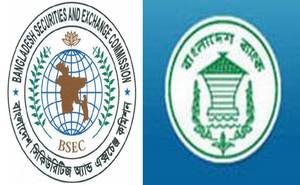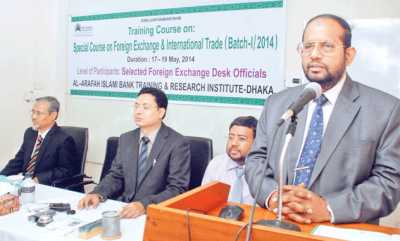Troubled with big loan forgeries, the state-owned BASIC Bank has now sought Tk600 crore from the government to raise paid up capital base.
An overall capital shortage of the bank stood at Tk1,372.01 crore by the end of year 2013.
On May 15, a letter signed by BASIC Bank managing director Kazi Fakrul Islam was sent to Bank Division Secretary Dr Aslam Alam seeking the fund to fulfil BASEll-II requirements. But the Bank Division do not know yet what it should do regarding the letter.
The division could not decide whether it should provide the fund to the bank under the existing management or wait till the reshuffle of it, said a senior official of the division.
One month ago, Finance Minister AMA Muhith asked the government to consider actions against the BASIC Bank board in accordance with suggestions made in a central bank report.
The Bank Division officials said the serious irregularities took place in BASIC Bank during last two and a half years.
Despite that, actions neither by the government nor the central bank have been taken yet against the bank.
“Bangladesh Bank has closely monitored the financial conditions of the BASIC Bank. We will act as per the central bank recommendations,” Dr Aslam Alam told the Dhaka Tribune.
However, the government will not extend the tenure of the current board of directors, he added.
Bangladesh Bank, in its routine investigations in 2012, mentioned about BASIC Bank’s abnormal credit growth, which ran as high as 40% at one point.
It is indicative of rampant financial irregularities and in many instances of such anomalies revealed, the bank’s board of directors and top managerial officials were involved, according to a central bank report.
They were engaged in giving loans with false documents and inadequate collaterals, it said.
The bank had come under the spotlight since loan scams of Tk4,000 crore were unearthed in 2012.
There are also allegations against the chairman of the bank Sheikh Abdul Hye Bacchu that he had direct involvement with the scams.
The letter said the necessary capital of the bank was Tk1,176.88 crore at the end of calendar year 2013.
Of the amount, the provision deficit was Tk788.81 crore and the reserve capital Tk195.13 crore.
After the adjustment, the total capital shortfall stood at Tk1,372.01 crore.
As per the decision of board, the board of directors urged the government to provide paid up capital of Tk1372.01 crore to the bank on urgent basis.
Under the BASEl-II, a 10% reserve needs to be put aside against risk-weighted assets of the commercial banks along with the road map to go for BASEL III for reserve of supervisory review process.
According to an agreement between BASIC Bank and Bangladesh Bank, BASIC Bank would limit its single borrower exposure to 15% of the bank’s total capital.
But the bank broke the deal exceeding the ceiling for 61 of its clients as it gave out Tk2,111 crore more in loans.
Bangladesh Bank asked the bank to raise its capital adequacy ratio (CAR) to 11% by the end of 2013.
The CAR on December 31 last year stood at 4.5%.
It was also expected to plug the capital deficit of Tk128.21 crore in 2013.
But the deficit widened to Tk647.38 crore by the end of December.
Of the total of 68 branches of the bank, 33 are making losses.
Bangladesh Bank put a limit on BASIC Bank’s loan growth in 2013.
It was first set at 10% and later upon the bank’s request it was extended to 20.63%.




 The
The